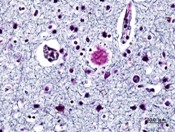
|
 |
Factors associated with physical aggression among nursing home residents with dementia
Jun 27, 2006 - 4:06:00 AM, Reviewed by: Dr. Ankush Vidyarthi
|
|
"It is not clear whether physical aggression may be related to factors that predispose to constipation (e.g., anticholinergic medications such as tricyclic antidepressants), the symptoms associated with constipation or interventions such as suppositories that may elicit a defensive action by some residents."
|
By Archives of Internal Medicine,
Depressive symptoms, delusions, hallucinations and constipation are associated with physical aggression among nursing home residents with dementia, according to a report in the June 26 issue of the Archives of Internal Medicine, one of the JAMA/Archives journals.
About 88,000 (6.8 percent) of U.S. nursing home residents are physically aggressive every week-hitting, shoving, scratching or sexually abusing others. This aggression can inflict physical and psychological harm on staff and other residents, according to background information in the article. Verbal aggression, when residents threaten, scream or curse at others, also can cause difficulties.
Ralph Leonard, M.D., M.P.H., of CALM-MD, LLC, St. Louis Park, Minn., and colleagues studied nursing home residents age 60 years and older with dementia who resided in one of five states: California, New York, Ohio, Pennsylvania or Texas. The authors used data from the participants' Minimum Data Set (completed in 2002), a health assessment completed regularly for all residents of nursing homes that receive federal funds. The assessment contains information about the resident's medical condition and functional status.
Of 103,344 residents (average age 84 years) who met the criteria for the study, 7,120 (6.9 percent) had been physically aggressive in the week before their assessment and 10.5 percent had been verbally abusive. After the researchers considered other factors that may play a role in aggression, including age, sex and the level to which residents were able to perform daily tasks on their own, they found that symptoms of depression, delusions, hallucinations and constipation were associated with physical aggression. With the exception of constipation, the same factors also contributed to verbal aggression.
 |
| Histopathogic image of senile plaques seen in the cerebral cortex in a patient with presenile onset of Alzheimer disease. |
Previous studies have linked psychological conditions to aggression, but this study was one of the first to examine the effects of constipation, the authors write. "We chose to study constipation a priori because it is common, modifiable and recognized by clinicians to be a cause of many non-specific symptoms," the authors write. "It is not clear whether physical aggression may be related to factors that predispose to constipation (e.g., anticholinergic medications such as tricyclic antidepressants), the symptoms associated with constipation or interventions such as suppositories that may elicit a defensive action by some residents."
"Physical or verbal aggression among nursing home residents with cognitive impairment may be a major cause of distress among staff and other residents injured by the aggressor, as well as to the aggressor," they conclude. "We found that aggressive behavior among residents was associated with depression, delusions and hallucinations, and that physical aggression was also associated with constipation. All of these factors may be amenable to intervention and, in addition to reducing the morbidity associated with these entities themselves, effective treatment may reduce the risk of violence in nursing homes." 
- June 26 issue of the Archives of Internal Medicine, one of the JAMA/Archives journals
Arch Intern Med. 2006;166:1295-1300
This study was supported in part by a grant from the National Institute on Aging (Dr. Leonard), the Donald W. Reynolds Foundation (Dr. Drickamer) and a grant from the Claude D. Pepper Older Americans Independence Center at Yale (which is supported by the National Institute on Aging).
|
For any corrections of factual information, to contact the editors or to send
any medical news or health news press releases, use
feedback form
Top of Page
|
|
|
|